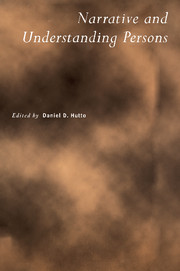Book contents
- Frontmatter
- Contents
- List of Contributors
- Notes on Contributors
- Narrative and Understanding Persons
- Framing Narratives
- The Narrative Practice Hypothesis: Origins and Applications of Folk Psychology
- Dramatic Irony, Narrative, and the External Perspective
- Episodic Ethics
- On the Distance between Literary Narratives and Real-Life Narratives
- Reasons to be Fearful: Strawson, Death and Narrative
- Stories, Lives, and Basic Survival: A Refinement and Defense of the Narrative View
- Self and Other: The Limits of Narrative Understanding
- Pathologies in Narrative Structures
Stories, Lives, and Basic Survival: A Refinement and Defense of the Narrative View
Published online by Cambridge University Press: 04 May 2010
- Frontmatter
- Contents
- List of Contributors
- Notes on Contributors
- Narrative and Understanding Persons
- Framing Narratives
- The Narrative Practice Hypothesis: Origins and Applications of Folk Psychology
- Dramatic Irony, Narrative, and the External Perspective
- Episodic Ethics
- On the Distance between Literary Narratives and Real-Life Narratives
- Reasons to be Fearful: Strawson, Death and Narrative
- Stories, Lives, and Basic Survival: A Refinement and Defense of the Narrative View
- Self and Other: The Limits of Narrative Understanding
- Pathologies in Narrative Structures
Summary
Everyone loves a good story. But does everyone live a good story? It has frequently been asserted by philosophers, psychologists and others interested in understanding the distinctive nature of human existence that our lives do, or should, take a narrative form. Over the last few decades there has been a steady and growing focus on this narrative approach within philosophical discussions of personal identity, resulting in a wide range of narrative identity theories. While the narrative approach has shown great promise as a tool for addressing longstanding and intractable problems of personal identity, it has also given rise to much suspicion. Opponents of this approach charge it with overstating or distorting the structure of actual lives.
I have defended a narrative account of personal identity in the past, and am still inclined to do so. I am, however, also sensitive to the complaints that have been leveled against this approach. In particular, the considerations raised by Galen Strawson in his Against Narrativity seem to me challenges that must be met. Strawson points to many real deficiencies in existing narrative approaches. The existence of these deficiencies does not, however, entail that the narrative approach should be rejected outright, as Strawson claims. Rather, it suggests that this approach needs to be clarified and refined. The more hyperbolic assertions must be weeded out, and claims about what work a narrative account of identity can accomplish must be made more modest and specific.
- Type
- Chapter
- Information
- Narrative and Understanding Persons , pp. 155 - 178Publisher: Cambridge University PressPrint publication year: 2007
- 43
- Cited by



